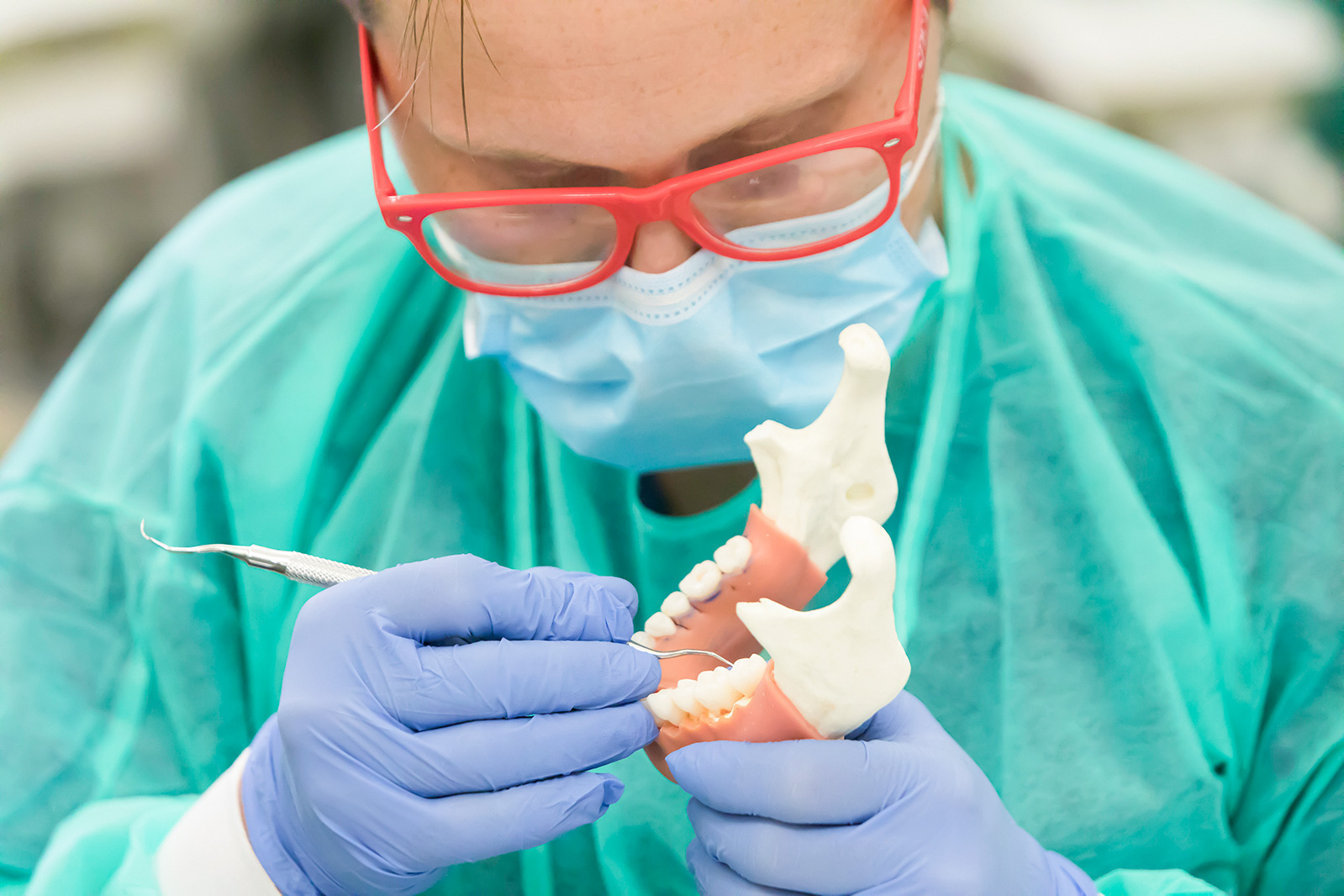
Doctor of Dental Surgery (DDS)
Ostrow trains oral health professionals who pioneer new techniques, conduct groundbreaking research and become extraordinary leaders in their fields.

Our learner-centered doctoral program combines basic science and clinical content over four years, to help you:
-
- Assess dental patients and deliver excellent care
- Develop effective communication skills
- Work effectively with colleagues
- Become a lifelong, self-motivated learner
- Contribute to innovation and advances in dental science
Ostrow’s Doctor of Dental Surgery (DDS) curriculum ensures that students receive the most up-to-date, learner-centered education possible, with a focus on the 25 competencies necessary to successfully complete the program.
GENERAL PROFESSIONAL COMPETENCY
1. Provide compassionate care for all individuals, including those from diverse, disadvantaged and at-risk populations in a variety of practice settings.
2. Apply ethical, legal and regulatory policies and principles to the provision and/or support of oral health care services.
3. Apply principles of self-assessment, critical thinking and problem-solving, and seek information to enhance professional competency.
4. Develop skills to access, critically appraise, apply and communicate scientific literature as it relates to providing evidence-based patient care.
PRACTICE MANAGEMENT
5. Understand the differences between various models of oral health care delivery and financing.
6. Understand the principles, regulations and procedures necessary to manage and lead a contemporary dental practice.
PATIENT CARE — COMPREHENSIVE ASSESSMENT, DIAGNOSIS AND TREATMENT PLANNING
7. Perform comprehensive diagnostic evaluations and risk assessments based on the application of scientific evidence with consultations, as appropriate.
8. Assess patient goals, values and concerns to establish rapport, guide patient care, maintain oral health and monitor therapeutic outcomes.
9. Formulate multidisciplinary, comprehensive, sequenced treatment plans based on diagnosis, prognosis and patient expectations, including discussion of risks, benefits and viable alternative treatment recommendations.
10. Recognize the normal range of clinical findings and significant deviations that indicate oral pathology and that require monitoring, treatment or management.
11. Recognize oral manifestations of systemic disorders and systemic complications of oral disease, and seek consultations as needed.
PATIENT CARE — COMPREHENSIVE TREATMENT
12. Provide patient education and preventive strategies to maximize oral health and well-being.
13. Assess, diagnose and manage dental caries.
14. Assess, diagnose and manage periodontal disease.
15. Manage procedures that preserve and restore tooth structure to optimal form, function and esthetics.
16. Restore edentulous spaces to optimal form, function and esthetics.
17. Assess, diagnose and manage pulpal and periradicular disease.
18. Assess, diagnose and manage conditions requiring surgical intervention.
19. Assess, diagnose and manage chronic orofacial pain and dysfunction, including temporomandibular joint disorders.
20. Assess, diagnose and manage occlusal and oral spatial abnormalities.
PATIENT CARE — MEDICAL AND DENTAL EMERGENCIES, PAIN AND/OR ANXIETY CONTROL
21. Anticipate, detect and manage medical emergencies that may occur in the dental setting.
22. Assess, diagnose and manage pain, hemorrhage, trauma and infection of the orofacial complex.
23. Select and administer or prescribe appropriate pharmacological agents used in the treatment of dental patients while being cognizant of and managing the potential for patient drug abuse.
24. Manage patients with pain and/or anxiety using appropriate non-pharmacological methods.
PATIENT CARE — COMMUNICATION
25. Communicate and collaborate with dental team members and other health care professionals in the management of and health promotion for all patients.
DOCTOR OF DENTAL SURGERY (DDS) CURRICULUM SNAPSHOT
Ostrow’s learner-centered environment supports students as they work in collaborative groups to solve challenging, patient-based problems. Our expert faculty encourages evidence-based strategies, critical thinking and problem-solving to aid you in acquiring the knowledge, skills and values needed to excel. Student input into ongoing curricular changes is encouraged.
Following is a snapshot of what to expect during the four-year DDS program.
YEAR ONE
Fall
- Fundamentals of Restorative Dentistry Module
- Anatomic Sciences, Microbiology, Pathology, Biochemistry, Physiology, Patient Management, Pharmacology
- Dental Morphology, Function and Esthetics Module
- Patient Management, Anatomic Sciences, Microbiology, Pathology, Oral Diagnosis
- Introduction to Ethics and Professionalism
- Biochemistry, Physiology, Anatomic Sciences, Microbiology, Pathology, Oral Diagnosis
- Diagnosis Rotation
- Radiology Rotation
- Patient Management, Periodontics, Microbiology, Pathology
- Extra and Intraoral Soft Tissue Exam, Oral Cancer Screening and Vital Signs Rotation
- Patient Management, Anatomic Sciences, Microbiology, Pathology, Biochemistry, Physiology, Endodontics
- Mock Patient Interview and Review
Spring
- Adhesive and CAD/CAM Restorations Module
- Microbiology, Pathology, Patient Management, Pharmacology, Biochemistry, Physiology, Anatomic Sciences
- Dental Morphology, Function and Esthetics Module
- Microbiology, Pathology, Patient Management, Biochemistry, Physiology, Pharmacology, Anatomic Sciences
- Behavioral Dentistry Module
- Microbiology, Pathology, Patient Management, Biochemistry, Physiology, Oral Diagnosis, Anatomic Sciences
- Ethics and Professionalism Module
- Biochemistry, Physiology, Patient Management, Anatomic Sciences
- Radiology Patient Rotation
- Microbiology, Pathology, Biochemistry, Physiology, Anatomic Sciences
- Diagnosis Rotation
Summer
- Indirect Restoration Module
- Anatomic Sciences, Oral Diagnosis, Patient Management, Biochemistry, Physiology, Microbiology, Pathology
- Head and Neck Anatomy Module
- Biochemistry, Physiology, Anatomic Sciences, Patient Management, Oral Diagnosis
- Periodontics Module
- Microbiology, Pathology, Oral Diagnosis, Anatomic Sciences, Patient Management, Pharmacology
- Radiology Patient Rotation
- Biochemistry, Physiology, Anatomic Sciences, Microbiology, Pathology Patient Management, Pharmacology
- Diagnosis Rotation
- Biochemistry, Physiology, Patient Management, Microbiology, Pathology, Orthodontics, Pediatric Dentistry
YEAR TWO
Fall
- Endodontics Module
- Anatomic Sciences, Microbiology, Pathology, Biochemistry, Physiology
- Orthodontics Module
- Pediatric Dentistry Module
- Microbiology, Pathology, Pharmacology, Anatomic Sciences, Biochemistry, Physiology
- Periodontics Module
- Anatomic Sciences, Microbiology, Pathology, Biochemistry, Physiology, Pharmacology
- Posterior Fixed Prosthodontics Module
- Biochemistry, Physiology, Microbiology, Pathology, Anatomic Sciences
- Treatment-planning Module
- Evidence-based Dentistry Module
- Biochemistry, Physiology, Patient Management, Microbiology, Pathology, Anatomic Sciences, Pharmacology
- Radiology Patient Rotation
- Diagnosis Rotation
Spring
- Anterior Fixed Prosthodontics Module
- Biochemistry, Physiology, Anatomic Sciences, Patient Management, Microbiology, Pathology
- Removable Prosthodontics Module
- Biochemistry, Physiology, Anatomic Sciences, Oral Surgery, Pain Control
- Treatment-planning Module
- Patient Management, Biochemistry, Physiology, Dental Anatomy, Occlusion
- Orthodontics Module
- Local Anesthesia and Nitrous Oxide Module
- Microbiology, Pathology, Patient Management, Pharmacology, Biochemistry, Physiology
- Periodontics Module
- Biochemistry, Physiology, Patient Management, Anatomic Sciences, Microbiology, Pathology
- Diagnosis Rotation
- Radiology Patient Rotation
Summer
- Emergency Medicine Module
- Biochemistry, Physiology, Microbiology, Pathology, Patient Management, Anatomic Sciences, Orthodontics, Pediatric Dentistry
- Ethics and Professionalism Module
- Biochemistry, Physiology, Pharmacology, Oral Surgery, Pain Control, Microbiology, Pathology, Patient Management
- Diagnosis Rotation
- Emergency Rotation
- Patient Management, Anatomic Sciences, Microbiology, Pathology, Biochemistry, Physiology, Orthodontics, Pediatric Dentistry
- Oral Surgery Rotation
- Anatomic Sciences, Biochemistry, Physiology, Dental Anatomy, Occlusion, Oral Surgery, Pain Control, Pharmacology
- Treatment-planning Seminar/Rotation
- Pediatric Dentistry Rotation
YEAR THREE
Fall
- Communication Module
- Oral Histology, Microbiology, Pharmacology, Periodontics, Laboratory Testing
- Communications, Patient Management
- Dental Morphology, Oral Histology, Physiology, Patient Management, Smoking Cessation, Dental Materials, Prosthodontics, Endodontics, Esthetic Dentistry
- Treatment-planning Seminar/Rotation
- Periodontics, Patient Management, Treatment Planning
- Rotations that may include: Community Outreach/Service Learning, Diagnosis, Emergency, Oral Surgery, Pediatric Dentistry
Spring
- Anatomy, Histology, Geriatrics, Physiology of Aging
- Orthodontics Module
- Patient Management, Office Management
- Oral Pathology Seminar/Rotation
- Anatomy, Physiology, Laboratory Management, Prosthodontics
- Treatment-planning Seminar/Rotation
- Anatomy, Biochemistry, Physiology, Oral Surgery, Medical Emergencies
- Rotations that may include: Community Outreach/Service Learning, Diagnosis, Emergency, Hospital Dentistry, Oral Surgery, Orofacial Pain/Oral Medicine, Pediatric Dentistry, Periodontics, Special Patients
Summer
- Periodontics Surgery Laboratory Module
- Practice Management Module
- Treatment-planning Seminar/Rotation
- Oral Pathology Seminar/Rotation
- Rotations that may include: Community Outreach/Service Learning, Diagnosis, Emergency, Geriatrics, Hospital Dentistry, Oral Surgery, Medicine/Orofacial Pain, Periodontics, Special Patients
YEAR FOUR
Fall
- Periodontics Surgery Laboratory Module
- Practice Management Module
- Treatment-planning Seminar/Rotation
- Oral Pathology Seminar/Rotation
- Rotations that may include: Community Outreach/Service Learning, Diagnosis, Emergency, Geriatrics, Hospital Dentistry, Oral Surgery, Medicine/Orofacial Pain, Periodontics, Special Patients
Spring
- Treatment-planning Seminar/Rotation
- Rotations that may include: Community Outreach/Service Learning, Diagnosis, Emergency, Hospital Dentistry, Geriatrics/IPE Geriatrics, Oral Surgery, Oral Medicine/Orofacial Pain, Periodontics, Special Patients
Ostrow students, with faculty supervision, provide free dental care to more than 17,500 low-income individuals each year through our Mobile Dental Clinic program and numerous local clinics and community events.
First-year DDS students at Ostrow benefit from significant preclinical experience, education and training in restorative dentistry using simulators, for a seamless transition to direct patient care by the end of year one. DDS students collectively serve about 12,000 patients in the school’s faculty-supervised, student-run oral health clinics.